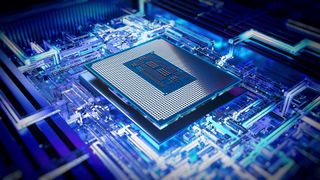
The word on the street is that Intel will launch its 13th Generation Raptor Lake non-K processors at CES 2023. Hardware leaker chi11eddog has shared some performance numbers for the upcoming chips. The tipster claims that a motherboard vendor conducted the tests for analysis; nonetheless, we recommend you cautiously approach the information.
Intel’s Raptor Lake K-series, such as the Core i9-13900K or Core i7-13700K, are among the best CPUs on the market. However, not everyone needs a large amount of firepower, which is where the non-K series offerings come into play. They retain the essence of their K-series counterparts, which are the core counts. However, the chips feature slightly slower clock speeds to conform to the 65W TDP.
The leak gives us a sneak peek at the performance of the Core i9-13900, Core i7-13700, Core i5-13600, Core i5-13500, and Core i5-13400. According to chi11eddog, the anonymous motherboard manufacturer tested the processors on the same motherboard with the same memory, so the results are directly comparable between the two generations of Intel chips. However, the leaker didn’t specify whether the vendor was using DDR4 or DDR5 memory. The vendor only used on benchmark (Cinebench R23) to evaluate the chips so the results only illustrate the processors’ performance in that particular software.
| Processor | Raptor Lake | Alder Lake | Performance Difference |
|---|---|---|---|
| Core i9-13900 / Core i9-12900 | 2,191 | 1,986 | 10% |
| Core i7-13700 / Core i7-12700 | 2,027 | 1,901 | 6% |
| Core i5-13600 / Core i5-12600 | 1,948 | 1,869 | 4% |
| Core i5-13500 / Core i5-12500 | 1,866 | 1,808 | 3% |
| Core i5-13400 / Core i5-12400 | 1,798 | 1,698 | 6% |
The results appear to show that there wasn’t a substantial uplift in single-core performance. The most considerable improvement was on the Core i9-13900, which outperformed the Core i9-12900 by 10%. The Core i7-13700 and Core i5-13400 also exhibited 6% higher single-core performance than the Core i7-12700 and Core i5-12400, respectively. The remaining Raptor Lake non-K chips offered less than a 5% single-core upgrade over the Alder Lake equivalents.
| Processor | Raptor Lake | Alder Lake | Performance Difference |
|---|---|---|---|
| Core i9-13900 / Core i9-12900 | 38,496 | 25,001 | 53% |
| Core i7-13700 / Core i7-12700 | 29,327 | 21,896 | 34% |
| Core i5-13600 / Core i5-12600 | 22,117 | 13,869 | 59% |
| Core i5-13500 / Core i5-12500 | 21,134 | 12,861 | 64% |
| Core i5-13400 / Core i5-12400 | 16,288 | 12,638 | 28% |
Multi-core performance on Raptor Lake benefits from the addition of more E-cores. Raptor Lake features double the amount of E-cores compared to Alder Lake. The extra E-cores brought a notable multi-core increase to Raptor Lake. In the case of the Core i5-13500, we see a whopping 64% upgrade over the Core i5-12500. The Core i5-13600 is another example where the chip delivered 59% better multi-core performance than the Core i5-12500. Finally, the Core i5-13400, which showed the lowest improvement, was 28% faster than its predecessor.
Intel's Raptor Lake non-K processors will compete fiercely with AMD's Ryzen 7000 army next year. Furthermore, Intel will launch its pocket-friendly B760 chipset so that budget-conscious consumers can pair the non-K chips with a cheap motherboard. Meanwhile, AMD is probably already preparing the brand's non-X Ryzen 7000 SKUs, such as the Ryzen 9 7900, Ryzen 7 7700, or Ryzen 5 7600, to fight back against Intel's Raptor Lake non-K army. We'll most likely see how the two square off early next year.
Stay On the Cutting Edge: Get the Tom's Hardware Newsletter
Get Tom's Hardware's best news and in-depth reviews, straight to your inbox.

Zhiye Liu is a news editor and memory reviewer at Tom’s Hardware. Although he loves everything that’s hardware, he has a soft spot for CPUs, GPUs, and RAM.
-
Roland Of Gilead Okay, so I'm looking at these charts and thinking it's all just a bit MEH! Single core increases kinda like the old 5% mark, and then an increase in multicore which mostly comes about from extra cores. Am I missing something?Reply -
TerryLaze Reply
The fact that it's amazing that we still get any improvement in core performance at all...Roland Of Gilead said:Am I missing something?
But yeah, CPUs don't get faster anymore, they get more throughput. -
PC Hardware Nerd It would be interesting to test if the extra cache on the new chips helps multithreaded performance of the P cores without the E cores.Reply -
bit_user Reply
The point of the article was multithreaded performance, not single-threaded.Roland Of Gilead said:Okay, so I'm looking at these charts and thinking it's all just a bit MEH! Single core increases kinda like the old 5% mark, and then an increase in multicore which mostly comes about from extra cores. Am I missing something?
Raptor Lake cores have the same microarchitecture as Alder Lake, and are made on the same process node. So, the fact that the performance delta is even that big is fairly impressive! Likely due to larger caches, but there are numerous other minor tweaks.Also, regarding the multithreaded benchmarks, I have to wonder if the DDR5 is running at a higher speed (they said it was the same RAM, but Raptor Lake could potentially run it at a higher speed).
Most Popular


